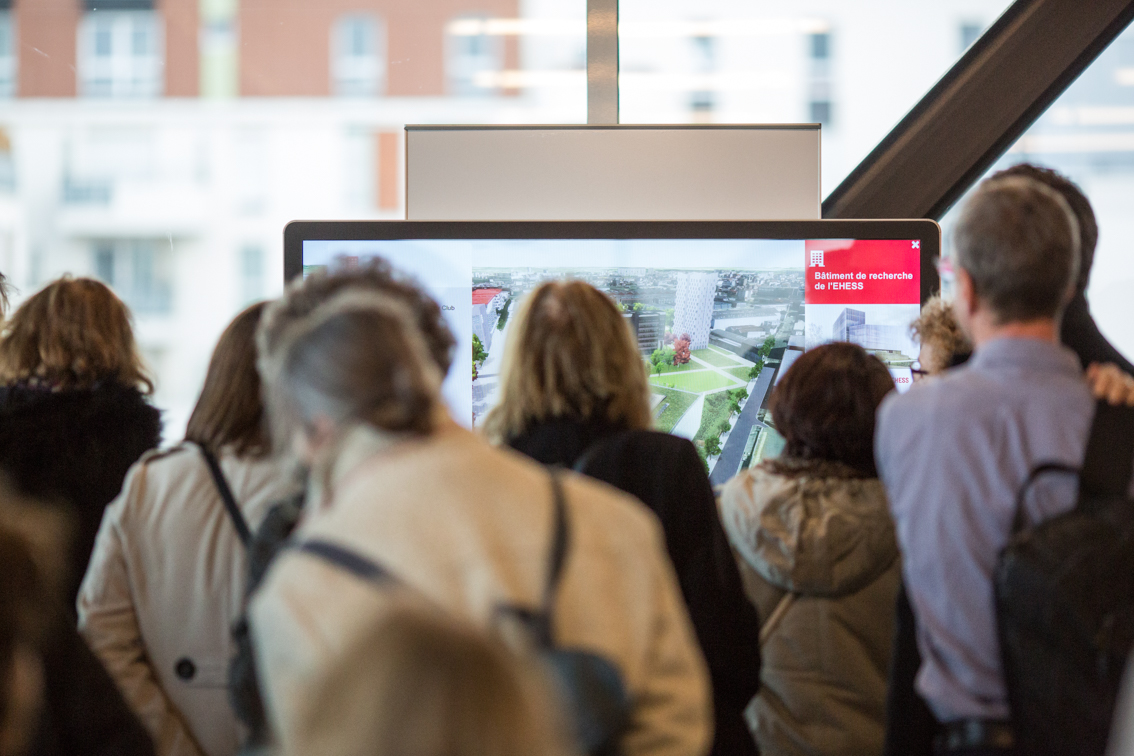An opportunity for SSH, an asset for the region
In the same section
Campus Condorcet was created to meet the need for high-performance, worldclass facilities for Social Sciences and Humanities (SSH), while contributing to the regeneration of the surrounding region.

EQUIPPING SSH WITH A NEW RESEARCH AND TRAINING FACILITY
Social sciences and humanities in France have long been recognised as brilliant and outstanding, earning them a global reputation. However, these disciplines have not always been endowed with the necessary facilities to teach their courses, develop their programmes, build upon their achievements and provide their students and researchers with comparable working conditions to those available in other countries. At a time when research is going global, when European and international programmes are developing and attracting stronger competition, when scientific methods are constantly evolving and current events are calling in social sciences and humanities expertise on a daily basis, it was essential to provide these disciplines with high-performance, worldclass facilities, so that they can continue to shine as they have done in the past. This need and this ambition are the driving forces behind Campus Condorcet, whose construction also contributes to the development and regeneration of the surrounding region.
In order to provide the social sciences and humanities field with a new research and research training centre, with all the necessary facilities for both students and researchers to be successful, the first step was to assemble a large, high-quality scientific community that would justify the major investment required. The Campus Condorcet Aubervilliers site will therefore bring together leading players in the research field - universities, schools or institutions - who have decided to establish an exceptional cluster of research and training activities.
ESTABLISHING HIGH-PROFILE RESEARCH CLUSTERS ON THE EUROPEAN AND INTERNATIONAL SCENE
The site will therefore host over one hundred social science and humanities research units, bringing together several thousand professor-researchers and researchers. 4,800 doctoral students, mainly from overseas, will attend the campus, making it one of the top centres for doctoral studies in social sciences and humanities worldwide. Several beneficiaries of the “Investments for the Future” programme for French centres of excellence - research laboratories (Labex) or equipment (Equipex) - are located on campus. The headquarters of Huma-Num, the Very Large Research Facility devoted to digital innovation in the social sciences and humanities fields, is also located on-site. Finally, there are also many nationally or internationally-funded research projects (ANR, ERC, etc.), which demonstrates the commitment of the campus members to projects of this kind.
This vast scientific community, with its outstanding teams of high-profile researchers, has taken up residence at Campus Condorcet and brought it to life. By joining forces, this community will be able to establish highly-reputed research clusters on the European and international scene, in four broad areas: historical sciences, textual sciences, territorial sciences and social sciences. It also gives rise to one of the largest centres for doctoral studies in social sciences and humanities, not only in France, but also in Europe and the world.
PLAYING A PART IN BUILDING THE CITY
Campus Condorcet forms a university district that is interspersed with public spaces and totally connected to its surrounding environment, with which it intends to maintain a close, harmonious relationship. The Paris - Porte de la Chapelle and Aubervilliers sites are taking root in areas that are currently engaged in a process of accelerated urban reshaping and transformation, with impetus from both the City of Paris and the établissement public territorial Plaine Commune.
The Campus intends to play a full part in this urban regeneration, in close cooperation with the local authorities involved, which will engender a new urban landscape in the northern Paris and Plaine Saint-Denis area. Situated in strategic locations, both the Paris and Aubervilliers campuses consider a successful relationship with the surrounding city as one of their major objectives.
This gives rise to a university campus that is also an urban campus, which is fully able to participate in energizing and renewing local urban identities, and to play a part in the innovative momentum that characterises the area.